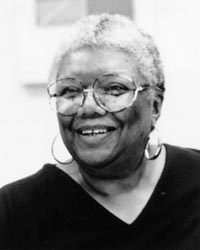
Lucille Clifton, a distinguished and prolific American poet and children’s book author, died on February 17th in Baltimore at 73. Clifton’s work was notable for it’s grace and it’s affirmation through her personal exploration of the experience of being black and female in the 20th century. She wrote her first poem in the late 1960’s at the end of the civil rights movement and published 30 books by her death earlier this month.
Clifton’s Good Times, the first volume in Good Woman: Poems and a Memoir, 1969-1980, was declared by the New York Times to be one of the year’s best books in 1969 for its “hard, angry poems.” Despite having written poems for Malcolm X and Eldridge Cleaver, Lucille Clifton disliked the impulse by critics to categorize her early work as part of the Black Arts Movement. In an interview with Charles H. Rowell in Callaloo, Clifton asserts that the Black Power Movement’s “sudden” realization and response to programmatic racial inequity seemed to her odd, although on the subject of The Movement she wrote:
“The Black Arts Movement was, in many ways, a movement to redefine the “black experience” in this country, to express the fundamental worthiness and beauty of black people in an America that had spent centuries trying to degrade people of African descent. The work of the artists of the Black Arts Movement became a significant part of the resistance to the forces that were killing us, both spiritually and physically”.
Clifton’s work is noted for saying much with few words and often without punctation. In an American Poetry Review article about her work, Robin Becker commented on Clifton’s lean style: “Clifton’s poetics of understatement—no capitalization, few strong stresses per line, many poems totaling fewer than twenty lines, the sharp rhetorical question—includes the essential only.”
In the poem jasper texas 1998 from her book Blessing the Boats, Clifton gives voice to James Byrd Jr., the victim of a hate crime, and forces us to face him .
i am a man’s head hunched in the road.
i was chosen to speak by the members
of my body. the arm as it pulled away
pointed toward me, the hand opened once
and was gone.
why and why and why
should i call a white man brother?
who is the human in this place,
the thing that is dragged or the dragger?
what does my daughter say?
the sun is a blister overhead.
if i were alive i could not bear it.
the townsfolk sing we shall overcome
while hope bleeds slowly from my mouth
into the dirt that covers us all.
i am done with this dust. i am done.
Most memorable to me was a poem I read in 7th grade, a story Clifton recounted about her mother – an uneducated laundress and a secret poet. When her mother was offered the chance to publish her poems, Lucille’s father forbade her to do so. In her poem “fury,†Ms. Clifton recorded her mother’s response:
she is standing by
the furnace.
the coals
glisten like rubies.
her hand is crying.
her hand is clutching
a sheaf of papers.
poems.
she gives them up.
they burn
jewels into jewels. …
she will never recover.
In 2007, Clifton became the first African-American woman to be awarded the extraordinary Ruth Lilly Prize for lifetime achievement by the Poetry Foundation. In announcing the award, it was said: “Lucille Clifton is a powerful presence and voice in American poetry. Her poems are at once outraged and tender, small and explosive, sassy and devout. She sounds like no one else, and her achievement looks larger with each passing year.†Lucille Clifton was to be the PSA’s 2010 Frost Medalist, to be awarded to her on April 1st, 2010.
Clifton said she continues to write, because “writing is a way of continuing to hope … perhaps for me it is a way of remembering I am not alone.” How would Clifton like to be remembered? “I would like to be seen as a woman whose roots go back to Africa, who tried to honor being human. My inclination is to try to help.”
You can shop for books by Lucille Clifton here

